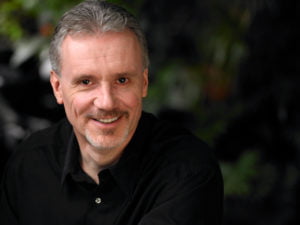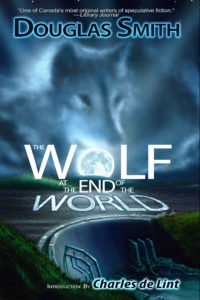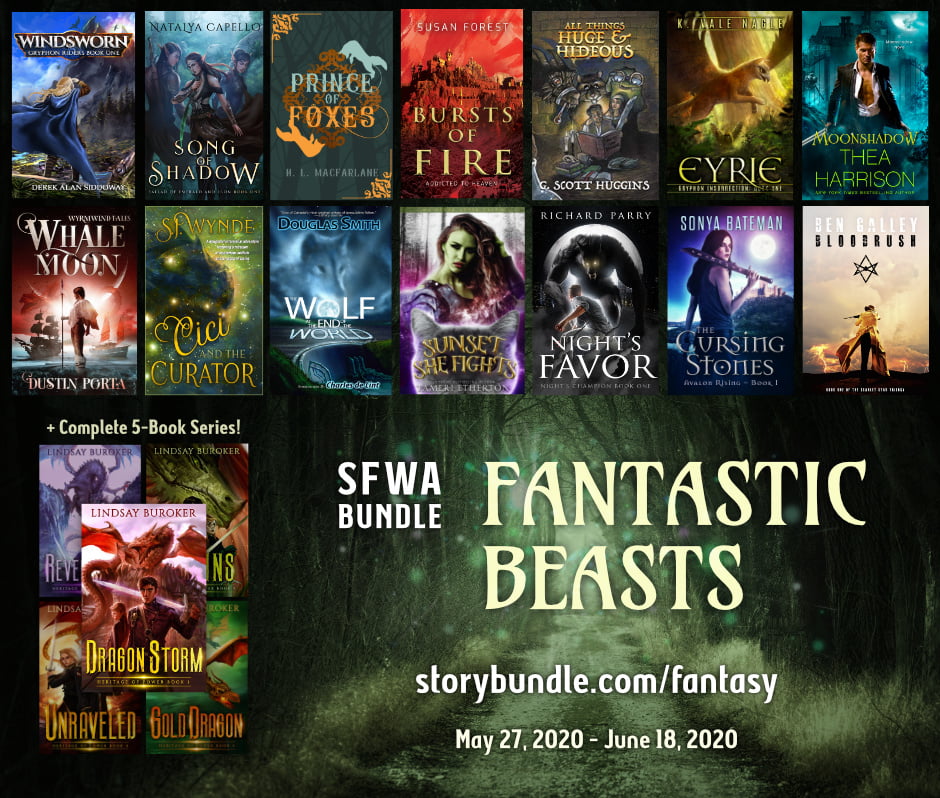 Douglas Smith’s book The Wolf at the End of the World is part of the SFWA Fantastic Beasts storybundle.
Douglas Smith’s book The Wolf at the End of the World is part of the SFWA Fantastic Beasts storybundle.
You can find Douglas on the web, or @smithwritr. If you want to do your part for charity and get some ass-kicking books for the price you choose, check out the Fantastic Beasts storybundle. Make sure you check the box for charity!
Q: You’ve gone all over the genre playground in your career … what made you write Wolf at the End of the World?
A: When I started, the first three short stories I wrote were urban fantasy tales in my Heroka universe, the name I gave my shapehifter species. My first story of those three, “Spirit Dance,” ended up being the first story I ever sold. After those initial stories, I wrote across a lot of genres–science fiction, horror, high fantasy, humour, and more urban fantasy–but I always planned to come back to the Heroka when I moved to novels. The Wolf at the End of the World picks up the lives of the characters from “Spirit Dance” five years later. The novel is stand-alone, but it was fun going back to that world and those characters and finding out what had happened to them in the past five years of their lives. Aside from getting to write those characters again, I wanted to expand on the themes of protecting our natural environment and animal habitats that run through the Heroka stories. The novel gave me a much larger canvas to tell a bigger and more complex tale around those themes.
 Q: You’ve been in magazines, done the international circuit, and got a backlist of novels titles. How would you coach a reader who wanted to start out as a writer?
Q: You’ve been in magazines, done the international circuit, and got a backlist of novels titles. How would you coach a reader who wanted to start out as a writer?
A: I still recommend that new writers start by writing short fiction. Short stories lets you learn the craft of fiction in more manageable chunks, and provide a built-in measure of how your craft is progressing, via when you start to sell your stories. You can try out ever so many genres, story structures, voice styles, and so much more in 100,000 words of short fiction than you can in a single 100,000 word novel. Your craft will advance faster if you start with short stories.
There are a lot of other advantages to starting with short fiction, and I discuss them all (and much more) in my writer’s guide, Playing the Short Game: How to Market & Sell Short Fiction. I wrote that book to try to make it easier for beginning writers to understand the business side of short fiction, and as my way of paying-it-forward.
Q: You’re with three heroes (or villains) of your stories. One’s suspected of murder. How does the dinner conversation go?
A: For this one, I’ve taken some liberties and included an extract from The Wolf that fits your scenario:
A mob of maybe two dozen people stood facing the cabin, about twenty feet back. They were a mix of Ojibwe and whites, mostly male. Some carried electric lanterns, some lit torches. Several had rifles. Ed stopped the truck at the edge of the clearing.
“What? No pitchforks?” Caz said. “What self-respecting mob brings torches and forgets pitchforks?”
On the cabin’s porch stood a tall, slim woman, dressed in a black leather jacket open over a dark blue top and tight jeans. Long black hair hung to her waist, framing a triangle of a face, with a small chin and sharp features except for a full mouth. She stood with her hands on her hips, unarmed, facing the mob. A large black cat peered from behind her legs.
“That her?” Caz asked. “Man, your ex is a hottie.”
Gwyn ran his eyes over the face and the body that he had known so well. He swallowed, taken by surprise by the intensity of the sudden ache in his chest.
Caz nodded at the crowd. “They brought dogs.”
Gwyn shook his head. “I’m not using the dogs against these people. They think Leiddia was behind a deadly animal attack. Maybe two.”
“Right. Not our best PR move.”
Gwyn sent a command to Gelert to stay in the back of the truck, and another to calm the dogs in the mob that were already reacting to his presence. He and Ed got out, Caz behind them. Some of the mob at the back had noticed them. The shouting died, replaced by a low murmur that spread as they approached. The crowd parted before them, and as they passed through, Gwyn recognized many of the faces and heard his name whispered.
When they reached the front of the mob, a man who looked like a younger version of Ed stepped forward to block their way. Charlie.
“I’ll handle this,” Ed said in a low voice to Gwyn and Caz.
Charlie glowered at Gwyn, then turned to Ed. “You brought him to town? Another one of them?”
“Does anyone like you here?” Caz whispered, looking around nervously.
Charlie jabbed a finger at Leiddia, who still stood calmly on her porch. “She killed Mary! She killed my daughter!”
The muttering grew. Somebody shouted “Killer!” Or maybe it was “Kill her!” Gwyn looked at the faces around them. This could get ugly very quickly. He touched the minds of the dogs in the crowd. Despite what he’d told Caz, he would protect themselves if necessary. In the back of the truck, Gelert stood up, instantly aware of his master’s needs.
Charlie stepped closer to Ed. “She killed your granddaughter!” he shouted, poking Ed in his chest.
Ed’s face was unreadable. He said nothing. He spread his gaze over the mob, and his eyes seemed to spread silence over them as well. The shouting died to nothing. Ed turned back to Charlie. “Step aside,” he said, just loud enough for everyone to hear him.
Charlie’s hands balled into fists, but then his eyes darted over the crowd. They were all watching him, waiting. Ed was a council elder and respected in town. And respect for parents and elders was core in Ojibwe culture. Charlie glared at Gwyn—then stepped aside.
Ed climbed the cabin steps to stand beside Leiddia on the porch, facing the crowd. Leiddia folded her arms as Gwyn came to stand on her other side, Caz beside him. She wasn’t smiling. She threw him a cold look, then turned back to the mob. “Hello, Dog,” she said.
“Cat,” he replied, trying to ignore how good she smelled.
“Don’t need your help.”
“Because you’re handling this so well yourself,” he replied.
“Glad you two’ve stayed friends,” Caz muttered. “Not a lot of couples can do that.”
Ed stepped forward. The muttering that had begun to build again in the crowd died. “My nigozis—my son—is right,” he said in a loud, strong voice.
“Oh yeah, I am so glad you guys showed up,” Leiddia said quietly, eyeing the crowd and looking worried for the first time.
“Still not too late for the dogs,” Caz whispered.
“Let him speak,” Gwyn growled, hoping Ed knew what he was doing.
“Charlie is right—about one thing,” Ed continued. “Mary was my granddaughter.” Silence fell on the crowd. “But he is wrong about this woman.” He put his hand on Leiddia’s shoulder. “And he is wrong to do this. You are all wrong to do this. This is not our way.” He swept his eyes over the crowd. “You know what Mary meant to me. Do you think I would stand here beside Leiddia if I thought she did this thing?”
Many in the crowd exchanged glances, shaking their heads. Ed pointed at a young Ojibwe man in the crowd. “Jimmy, you think I’d stand beside Mary’s killer?”
Jimmy shook his head and looked down. Ed pointed at a big white man holding a rifle. “Lars? Do you?” Lars looked sheepish and lowered the gun.
Ed scanned the crowd. “Anybody?” Most of the crowd shook their heads. Others just stared at the ground. Ed nodded. “Then go home. Go home to your families. Go home to bed.”
But Charlie stepped forward again. “Then who killed Mary, if she didn’t? Tell me that, old man.”
“Not our place to say,” Ed said. “Police will handle that.”
Charlie laughed. “The cops? The same ones who forced us off our lands at gun point so the government could flood them? Those the ones?” He walked toward Ed. Gwyn braced himself for a fight, but something went out of Charlie just then. His shoulders slumped. He looked up again at Ed, his eyes glistening. “Those the ones who’re going to tell me, pop? Tell me who killed my little girl?”
The muscles played along Ed’s jaw. He stepped off the porch and reached for his son. But Charlie just shook him off. Turning, he stalked away. Leiddia took a deep breath and let it out, and then walked down the steps to give Ed a big hug.
“You may not have many friends, Gwyn,” Caz said, nodding at Ed, “but the ones you do have are very cool.”
Check out The Wolf at the End of the World in the Fantastic Beasts storybundle:
Discover more from Parrydox
Subscribe to get the latest posts to your email.
